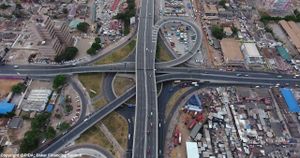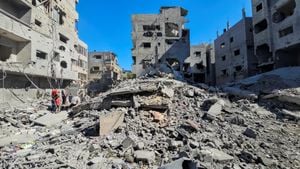Across Mozambique, the streets are filled with cries for change as citizens rise against decades of political oppression and corruption. The nation's people have taken to the streets since the recent controversial elections on October 9, 2024, where allegations of widespread fraud prompted protests across the country, especially concentrated in the capital, Maputo. Many feel completely disenfranchised, claiming their voice is lost under the weight of the ruling party, Frelimo, which has held power for 49 years.
The discontent surged dramatically when it was reported on October 24, 2024, by election authorities, including the National Electoral Commission (CNE), who awarded Frelimo 70% of the vote. Official results, coupled with subsequent internet blackouts, left many questioning the integrity of the electoral process. The opposition party, Podemos, contends through their parallel counts, led by independent candidate Venâncio Mondlane, shows him winning the voting, leaving Frelimo far behind with only 35.66%.
With frustrations simmering, the phrase "Frelimo must fall" echoed among protesters who barricaded roads with burning tires. Julia Macamo, a street vendor and mother of six, stated emphatically, “This is it. If we don’t stand up now, nothing will change.” Her sentiment resonates deeply across Mozambique, where deep poverty and limited economic opportunities clash against the country’s untapped wealth of natural resources.
The situation starkly contrasts the elite's lifestyle who reap the benefits of these resources. While TotalEnergies and Exxon Mobil are actively pursuing billions of dollars worth of gas projects, these developments have stalled due to rising insurgencies and instability. The resentment festers as the common citizen sees the wealth beneath their feet, yet struggles to make ends meet.
Resistance to Frelimo’s rule has not merely been about elections. It's rooted deeply within issues of poverty, inequality, and corruption, highlighted by the past administration of Armando Guebuza. His steered governance laid the groundwork for the current tensions with allegations of financial mismanagement and bribery through various schemes like the Hidden Debt scandal, causing economic distress for the entire nation. Such governing strategies created deeply entrenched systems of inflation and wealth accumulation favoring the few elites over the many disenfranchised citizens.
Young, socially aware activists like Jessica Muando, who participated actively during the protests, stressed the urgency of their efforts, “Our generation must act now to secure a brighter future.” This vote is perceived not just as political but as existential—indicating whether future generations can enjoy stability and opportunity within their own country.
Reports are now surfacing claiming alliances among police and army personnel with protesters, emboldened by their shared dissatisfaction with the ruling elite. “If those supposed to control us join us, it shows how deep-seated the corruption is,” noted activist Jorge Tembo. This alliance hints at cracks beginning to form within the structures of power.
Despite the widespread unrest, Frelimo remains entrenched, evidently secure, with rumors pointing to President Filipe Nyusi retreating to Pemba. While members of his administration seek safety amid growing turmoil, the majority of Mozambicans stand resolutely determined to instigate change. The longstanding governance model, where political manipulation thrives, is now under severe scrutiny.
Pressure for dialogue has also commenced. Venâncio Mondlane suggested discussions to handle the electoral disagreements, calling for total transparency and accountability from the CNE. The global community waits with bated breath as officials urge for the release of clear, unambiguous votes from polling stations—yet the silence from Nyusi’s administration on pressing matters raises suspicions.
Conflict has had its place even among allies and observers, with regional actors calling for unity from leaders of different political parties both within and outside Mozambique. Historical parallels can be drawn from practices seen during the political reconciliations after turmoil seen previously, such as the cases of Kenya and Zimbabwe.
The global community's interest is tangible as large potential foreign investors anticipate stability to facilitate profits from Mozambique’s resource boom. International financial assistance may become leverage as regional governmental bodies and western allies insist Frelimo’s leadership steps aside. Both the US and EU possess substantial influence, potentially halting significant financial aide if the administration fails to address the rising humanitarian crisis.
While civil unrest continues to erupt throughout the streets, constitutional avenues appear distant with the country's judicial process seemingly intertwined with political undercurrents. The Constitutional Council's hesitant maneuvering raises questions about its independence and commitment to delivering justice. With current unrest simmering and people's frustrations reaching fever pitch, the empire built on years of impunity now teeters on the edge.
With winds of change howling louder, the Mozambican people are calling not simply for electoral justice or basic rights—but for autonomy over their destinies, the breaking of chains forged by decades of neglect, corruption, and authoritarianism. The struggle continues and reverberates well beyond their borders, as the quest for justice and transparency holds immense significance for nations witnessing the rise of civic engagement and accountability.
What the future holds is uncertain, but there is one resounding truth: the people of Mozambique are not ready to back down. Their resolve and unity may just be the wind of change necessary to heal their nation from its past wounds and forge the path to its future.



